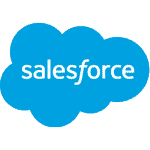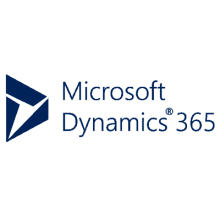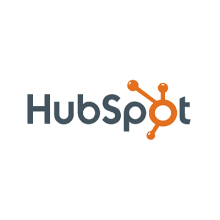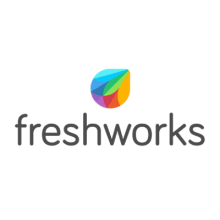Salesforce CRM is the world’s #1 customer relationship management platform. As the Gold Standard for CRM, it empowers businesses to manage the customer lifecycle and analyze customer interactions throughout it. It offers a suite of cloud-based applications, including Sales Cloud for sales automation, Service Cloud for customer support, Marketing Cloud for digital marketing, and Commerce Cloud for ecommerce solutions. These integrated tools (which also integrate with other tools like ERP and marketing automation) facilitate streamlined processes, enhance the customer experience, and drive growth by providing a unified view of customer data across all touchpoints.
Designed for businesses of all sizes and industries, Salesforce CRM serves a diverse clientele, from small startups to large enterprises. As of 2025, Salesforce boasts over 150,000 customers worldwide, including major corporations like Walmart and Amazon Web Services (AWS). The platform’s scalability and customization options suit various business needs, allowing companies to tailor the system to their specific requirements. On top of all that, Salesforce’s commitment to innovation is clear in its continuous integration of advanced technologies, such as artificial intelligence and automation, which guarantee users can tap into the CRM industry’s most cutting-edge tools for sales optimization and customer engagement.
Why this product is good
Positives for Salesforce CRM Software
Product Details
What is Salesforce CRM?
Salesforce is a cloud-based CRM that businesses use to manage customer relationships and optimize sales processes. You can use the platform to track leads, manage accounts, store contacts, generate reports, automate tasks, and find new customers. Its subsidiaries include Pardot, Tableau, MuleSoft, and Salesforce Marketing Cloud. At its core, Salesforce is an enterprise tool that helps companies unify customer data, personalize the customer experience, and build relationships that last.
Features of Salesforce CRM include:
- Contact and opportunity management
- Sales forecasting
- Quote-to-cash (QTC)
- Einstein Analytics
- Small Business support
- Omnichannel marketing
- Mobility
- Email integration
Contact and opportunity management: Cloud-based contact management makes cross-functional collaboration easier and allows companies to better capture customer data. With Salesforce, teams can quickly create and share detailed accounts, contacts, leads, and opportunities in one place for easy access. Opportunity management gives businesses a chance to get an up-close look at the activity timeline of their customers and see exactly which stage each deal is in, helping them make informed decisions about your next move. Not only can they view critical details along with those of competitors, but ready-made templates let you send messages to clients without any extra effort. From a managerial perspective, it’s also easy to view and manage pipeline data, sales performance insights, and activity metrics right from your dashboard.
Sales Forecasting: With Salesforce CRM, organizations get an all-encompassing overview of their pipeline and how well the business is performing. It monitors the path of leads in the funnel to assess whether they are converting into deals or not. Through this analysis, it provides a thorough prognosis on sales organizations can use to adjust strategies accordingly for maximum success. This reporting can also be used to identify top performers and recognize any areas for improvement.
Quote-to-cash (QTC): By harnessing the power of Salesforce CRM, you can automate quote management and make life easier for your sales representatives. Configure, price, and quote (CPQ) tools provide them with the latest discounts to offer customers quickly and accurately. The entire process is further accelerated as users swiftly create quotes before submitting proposals in Salesforce Lightning, followed by fast invoicing and efficient cash collection. You can also design and automate intricate sales workflows using the Flow Orchestrator to drive consistency and efficiency across your sales department.
Einstein Analytics: Einstein Analytics is the premier business intelligence tool for unlocking complex sales and service insights. Not only do embedded dashboards connect users to Sales, Service and Community Clouds, but they also consistently provide employees and partners with data-driven insights. And data security is a top priority for Einstein experts—this analytical tool delivers intelligent solutions, so businesses can confidently share data in pursuit of growth.
Small Business Support: With Trailhead, Salesforce has made it easier for small businesses and startups to grow and succeed. This application employs artificial intelligence to provide customers with the best-in-class services possible. Thanks to its 360-degree customer view, Trailhead can capture data from emails, support channels, calendars, and numerous other customer data sources. There is also a setup assistant that answers inquiries and provides customized advice to help businesses get off the ground faster. With numerous tutorials available within the app itself, beginners can learn about all of Salesforce’s products—including CRM—but get into the nitty-gritty details as well.
Omnichannel Marketing: With Salesforce CRM analytics, marketing teams can easily launch and monitor multiple campaigns from a single platform and receive instant insights on their performance. From email to social media campaigning, Salesforce keeps track of every action taken and compares the efficacy of each against the entire omnichannel strategy (e.g., Facebook vs. email results). This data allows for smarter business decisions about investment plans and informs how marketing activities impact sales.
Mobility: The Salesforce mobile app offers users the convenience of accessing their CRM data on the go, at any time, and from virtually anywhere. With a few taps, they can view meetings, events, or account updates immediately. Plus, making conference calls and taking notes in real time is incredibly easy with the mobile app. And for times when internet service is spotty or intermittent, all offline data will be updated as soon as the device connects to the web again.
Email Integration: With just a few clicks, Salesforce Dashboard Components, enable stakeholders to observe major trends and quantify operations to gain insight into team performance. Building custom dashboards with drag-and-drop icons from within Salesforce CRM will give you the power of a 360-degree view of all things related to the business. Users can produce data reports based on preferences through an intuitive drag-and-drop UI.
AI-powered sales automation: Central to the Salesforce platform is Einstein GPT, a generative AI that automates complex tasks such as drafting personalized emails, generating insightful reports, and predicting customer behaviors, thereby enhancing decision-making processes. The Agentforce platform introduces autonomous AI agents capable of managing routine sales and service interactions, allowing human teams to focus on strategic initiatives. These agents leverage real-time data integration through MuleSoft, ensuring seamless connectivity across various applications and data sources, which enhances operational efficiency.
Tailored functionality for different industries: Salesforce has now expanded its Industry Clouds, offering tailored functionalities for sectors such as healthcare, finance, and retail. They’re built upon Salesforce’s CRM and Customer 360 platform and offer pre-built applications, best practices, templates, workflows, and data models, enabling organizations to accelerate digital transformation and achieve greater efficiency.
What are the advantages of using Salesforce CRM?
Salesforce CRMs Benefits
Salesforce CRM gives businesses a comprehensive view of their customers, sales performance, and activities. It offers lead and opportunity management, workflow and approval automation, customer analytics, marketing segmentation, and data-driven insights.
Benefits of Salesforce CRM include:
- Real-time analytics: Salesforce’s analytics engine is one of the most powerful in the industry, enabling users to access real-time customer data from all connected systems. Particularly for enterprises with complex data infrastructure (e.g., CRM, ERP, cloud data warehouses, etc.), the ability to compile and analyze data from multiple sources into a single ecosystem is invaluable.
- 360-degree customer insights: Through Salesforce Cloud 360 (the collection of tools connecting all your Salesforce apps and creating a unified customer profile), you’ll get even more granular insight into customer behavior and preferences. This enables targeted segments on specific customer groups, which helps increase conversion rates and ROI. With higher-priced software versions, marketers can also access powerful AI-based insights to optimize campaigns more effectively.
- Security: Salesforce’s cloud platform is designed with security as a top priority. All data stored in the cloud are encrypted, and all applications undergo rigorous testing before release. Businesses have the option to assign varying levels of security clearance to users, ensuring that sensitive customer data remains secure.
- Scalability: A key benefit of utilizing Salesforce is that it can scale with a business as it grows. This platform has no limitation on the number of users, and its features are easily customizable to suit the needs of any organization. This ensures businesses can stay competitive in their industry without worrying about breaking their budget.
- Process automation: Automating key processes is one of the most efficient ways to improve the efficiency of any organization. With the Salesforce platform, businesses save time and money by automating repetitive tasks like responding to customer inquiries, processing orders, and tracking shipments. That way, employees can focus on more critical aspects of their job.
- Integrations for everything: You can integrate Salesforce CRM with a wide range of third-party applications, making it easier for businesses to connect their existing systems and access data from multiple sources. This enables them to make decisions based on more accurate, up-to-date information.
- Comprehensive IT support and resources: Salesforce provides businesses with the necessary IT support and resources to ensure their CRM is always up-to-date. The company offers training sessions, user forums, and an extensive library of resources to help users get the most out of their CRM implementation. Salesforce Trailhead is also an excellent resource that helps employees learn about Salesforce development.
Prices
Salesforce Cloud CRM Pricing
In addition to a free trial for each subscription level, Salesforce offers five different CRM pricing plans to accommodate businesses of different sizes and requirements. The primary editions include:
- Starter Suite: Designed for small businesses, this plan is priced at $25 per user per month. It provides essential sales and support functions in a unified platform.
- Pro Suite: At $100 per user per month, this edition offers enhanced tools for marketing, sales, service, and commerce, suitable for teams seeking more advanced capabilities.
- Enterprise Edition: For $165 per user per month, this plan delivers advanced customization options, workflow automation, and API integrations, catering to businesses with complex needs.
- Unlimited Edition: Priced at $330 per user per month, this comprehensive package includes all Enterprise features plus unlimited customizations, multiple sandboxes, additional data storage, and 24/7 support.
- Einstein 1 Sales: At $500 per user per month, this top-tier offering encompasses all features of the Unlimited Edition, along with generative AI capabilities, performance management, sales programs, team collaboration via Slack, and unified data management with Data Cloud and Revenue Intelligence.
It is also worth noting that implementation can be a significant-added cost to Salesforce CRM. Setting an organization up with Salesforce requires professional IT assistance, typically through a third-party Salesforce consultant or partner. The cost of implementation depends on the complexity and customization required within the system.
What industries are best suited for this solution?
Salesforce CRM for Industries
Thanks to its extensible and customizable nature, Salesforce CRM is one of the most versatile CRMs on the market. It can be as generalist or as specialized as you need. It can be as simplified or as intricate and feature-rich as your business’s workflows. And through industry-specific solutions, Salesforce CRM can cater to the unique needs of various industries, including retail, telecom, SaaS, education, travel/hospitality, media and entertainment, nonprofit, manufacturing, and even government and public sectors.
Here’s a look at different industries and how Salesforce CRM can benefit their sales processes:
Software as a Service (SaaS)
Subscription management: The Subscription Management module in Salesforce Revenue Cloud allows SaaS companies to automate and streamline the entire subscription lifecycle, from initial sign-up and provisioning to renewals and upgrades. It supports any billing frequency, proration, and automated invoicing scenario, and facilitates accurate revenue recognition and reconciliation on the backend.
Usage-based billing: For SaaS products that charge customers based on usage metrics (e.g., API calls, data storage), Salesforce CRM can track customer usage in real-time and generate invoices accordingly. This ensures transparency and accuracy in billing, enhancing customer trust and satisfaction.
Churn prediction and management: Leveraging Salesforce’s AI capabilities, this feature analyzes customer engagement metrics, product usage patterns, and support interactions to predict potential churn. By identifying at-risk customers early, SaaS companies can implement targeted retention strategies, such as personalized outreach or tailored offers, to improve customer retention rates.
Telecommunications
Billing Inquiry Manager: This tool enables service agents to manage customer billing and payment-related processes directly within the Salesforce service console. By leveraging predictive and generative AI capabilities, agents can efficiently address billing inquiries, reducing average handling and training times.
Enterprise Product Catalog (EPC): EPC allows telecommunications companies to design, test, launch, and manage both commercial and technical products from a unified catalog. This integration enhances operational efficiency by simplifying product lifecycle management and ensuring consistency across various business segments.
Asset-based ordering (ABO): This feature enables service providers to create quotes and orders directly against a customer’s existing assets. By referencing current services during the order capture process, ABO facilitates seamless Move, Add, Change, and Disconnect (MACD) operations, ensuring accurate tracking and management of customer assets throughout their lifecycle. Once MACD orders are created using Industries CPQ, they are seamlessly submitted to Industries Order Management for processing.
Healthcare and Life Sciences
Advanced Therapy Management: Advanced therapies, like CAR T-cell treatments, involve complex, multi-step processes that require meticulous coordination. Salesforce’s Advanced Therapy Management (ATM) streamlines these processes through multi-step scheduling across multiple sites, chain of custody tracking for patient samples and therapies, and therapy orchestration (managing tasks, documentation, and communications).
Benefits verification: Navigating insurance coverage is difficult for both patients and providers. Salesforce’s Benefits Verification feature simplifies the process by integrating within the patient record and connecting with third-party benefits and eligibility services. That way, healthcare providers can verify a patient’s insurance coverage and specific benefits instantly. To facilitate interactions with payers and healthcare providers, the system generates call scripts that include patient information, insurance coverage details, and pertinent questions about pharmacy coverage.
Care Program Management: Salesforce’s Care Program Management improves patient outcomes through its enrollment and management tools. Healthcare providers can enroll patients into tailored care programs and manage their progress, and the system supports the creation of individualized care plans. It also tracks adherence and monitors outcomes to ensure patients receive appropriate interventions. By collecting and analyzing data on patient engagement and health outcomes, the platform also offers insights that help refine care programs.
Financial Services
Actionable Relationship Center (ARC): ARC provides a dynamic visualization of client relationships, enabling financial advisors to see multiple layers of connections and related key information in one place. This holistic view helps identify areas of opportunity and drive contextual actions, enhancing client engagement and service personalization.
Financial goals and plans: Within Salesforce CRM, Financial Services Cloud empowers advisors to collaboratively set and manage actionable financial goals with their clients. This feature allows for the creation of tailored financial plans that align with clients’ aspirations, facilitating proactive tracking and adjustments to ensure clients stay on course to achieve their financial objectives.
Action plans: This feature enables the automation of repeatable tasks and enhances collaboration within financial institutions. Advisors can create templates with prioritized and assigned tasks for processes like onboarding new clients or managing accounts, ensuring consistent and compliant execution of critical workflows.
CPQ Integrations
Which CPQ Solutions Integrate with Salesforce CRM?
As the industry leader, Salesforce can integrate with just about every CPQ (configure, price, quote) platform. Currently, Salesforce customers are best off choosing one of these eight CPQ solutions:
- Salesforce CPQ
- DealHub CPQ
- Experlogix CPQ
- Epicor CPQ
- Conga CPQ
- PROS CPQ
- Tacton CPQ
- Configure One CPQ
Salesforce CPQ
Salesforce has its own CPQ tool, aptly named Salesforce CPQ. With this Salesforce CRM app, users can easily manage your product quotes—from tracking products associated with the deal to standard prices and quoted prices. Plus, Sales Cloud customers have control over setting criteria for quantity, delivery terms, and payment schedules that reflect in the quote.
On top of that, Salesforce CPQ has a built-in quoting software that auto-populates customer data for quick quoting. After the quoting process is over, it generates an approved template PDF and sends emails directly to customers.
DealHub CPQ
The DealHub Revenue Hub is purpose-built to improve the overall sales process. DealHub CPQ enables faster production of accurate quotes and orders with dynamic pricing, automated approval workflows, auto-synced data, and version control out-of-the-box. Companies can create interactive sales playbooks with DealHub and guide reps through each stage of the customer journey, streamlining every Salesforce user’s sales process.
Integrating DealHub with Salesforce CRM is particularly beneficial for B2B SaaS companies. Software companies can utilize DealHub’s digital sales room, customer engagement insights, subscription management, consumption-based billing, and revenue recognition automation features to streamline recurring revenue. Integrating Salesforce CRM with DealHub enables stakeholders and customers to collaborate on deals without ever leaving the Salesforce UI.
Experlogix CPQ
Experlogix CPQ provides Salesforce users with comprehensive yet easy-to-use functionality, including dynamic pricing, product configuration, and order management. It’s powered by Microsoft Dynamics 365 technology and supports the Salesforce platform. Experlogix CPQ offers high-end product modeling capabilities that allow users to configure complex products to the last detail—in minutes, not hours.
Experlogix takes a transformative approach to product visualizations with Image Compositing in Experlogix CPQ. From enhancing colors and textures to creating intricate compositions comprised of multiple layers and effects, resellers and customers can collaborate to create the perfect product match.
By leveraging Experlogix CPQ’s intelligent workflow approval requests, sales teams can work together efficiently and reduce delays in approvals from management and engineering. This solution will trigger Salesforce workflows for discounts, change orders, and other related processes—allowing sales orgs to streamline the entire process.
Epicor CPQ
Epicor CPQ (formerly KBMax) is designed for manufacturers and distributors who need an integrated and efficient customer-focused system. Epicor’s CPQ solution revolutionizes the selling experience, empowering every Salesforce user to easily configure products in 2D, 3D, or augmented reality with interactive product configurators.
Epicor CPQ provides customers, distributors, and sales teams with the flexibility to customize and configure their products from any location, including their websites. This user-friendly technology makes it easier than ever before to make purchases quickly and conveniently. And since it’s easy to integrate with Salesforce B2B Commerce Cloud, the purchase process is fast and secure.
Conga CPQ
Conga CPQ is a cloud-based CPQ platform that Salesforce customers use to customize, send, and export quotes. Conga CPQ automates the sales quoting process, from configuring complex products to generating professional quotes and contracts. It also helps streamline operations, including pricing rules and discounting, currency conversion, discounting, and compliance checks.
The Conga ecosystem is built to run alongside Salesforce. Conga Quote Generation can work with Salesforce CPQ to create, send, and track quotes—all without ever leaving Salesforce. And Conga’s Integration Package provides a seamless solution from CPQ to CLM. With the pre-built integration framework, Salesforce users can go live in just four hours and experience full deployment within two weeks. Conga enables organizations to leverage their Salesforce data for greater revenue with less effort.
PROS CPQ
PROS Smart CPQ makes selling complex products and services easier for Salesforce users by making its revenue and profitability realization platform natively integrated. Leveraging the power of predictive analytics, its smart Salesforce CPQ (configure, price, quote) solution provides insightful recommendations on products and services tailored to customers’ needs at competitive prices.
PROS is also Salesforce-certified and readily integrated with Salesforce Lightning, making it one of the best Salesforce CPQ solutions on the market. Because of its deep integration, it uses Salesforce to create a holistic selling experience on mobile, social, and cloud-based platforms. PROS makes it easy to create accurate quotes, forecast revenue, and track customer trends in real time.
Tacton CPQ
When you use Tacton CPQ software for Salesforce, selling customized items becomes effortless. Designed for B2B manufacturers, Tacton can handle even the most intricate configurations. Tacton CPQ’s out-of-the-box capabilities enable Salesforce users to express millions of product variants to configure complex products. Features like guided needs-based selling, AR technology, and Visual Configurations enable sales reps to configure products to match customer needs.
Tacton’s powerful pricing engine and intelligent quoting capabilities ensure your prices and margins are instantly accurate after each configuration, regardless of the pricing model or sales channel, helping users maximize profits. Utilizing analytics to power your Business Intelligence tools with Tacton’s CPQ data improves your product portfolio and sales operations. Tacton’s powerful integration links your enterprise systems with new product introductions and sales-to-order processes. With this tool, you can produce accurate sales orders in ERP quickly and sync all of your selling data to Salesforce seamlessly.
Configure One CPQ
Configure One CPQ is a specialized solution for manufacturing and other industries requiring intricate product configurations. This application allows sales reps to create individualized configs of complex items, compute pricing in real-time, integrate factory data into the system, supply customers with complete product quotes quickly, and expedite orders.
It is precisely this manufacturing capability that makes Configure One a good fit for Salesforce users. By coupling Salesforce’s CPQ integration with Configure One, users can directly tie customer data from Salesforce into the Configure One quoting interface while conveniently populating all quote information. Product configurations, customer data flows, and dynamic pricing can all be pre-populated and quickly sent off for customer review.
Valuable Insight From Real Customers
Gartner Peer Insights
Out of 1,975 ratings, Salesforce CRM has a rating of 4.5 out of 5 stars on Gartner Peer Insights. In their reviews, users note the software’s extensive features and integrations help provide one single unified experience for the customer. However, some users mention the price and data integration issues as disadvantages.
The reviewers and customer demographics are as follows:
Reviewer’s Company Size
- <$50M USD: 28%
- $50M-$1B USD: 42%
- $1B-$10B USD: 16%
- $10B+ USD: 10%
- Gov’t/PS/Ed: 4%
Reviewer’s Industry
- IT Services: 18%
- Services (non-Government): 12%
- Manufacturing: 8%
- Miscellaneous: 8%
- Other: 54%
Reviewer’s Deployment Region
- North America: 59%
- Asia/Pacific: 24%
- Europe, Middle East, and Africa: 13%
- Latin America: 5%
Gartner Peer Insights affirms that Salesforce CRM increases sales productivity, as cited by the reviews on their site.

Andrew is a professional copywriter with expertise in creating content focused on business-to-business (B2B) software. He conducts research and produces articles that provide valuable insights and information to his readers.







